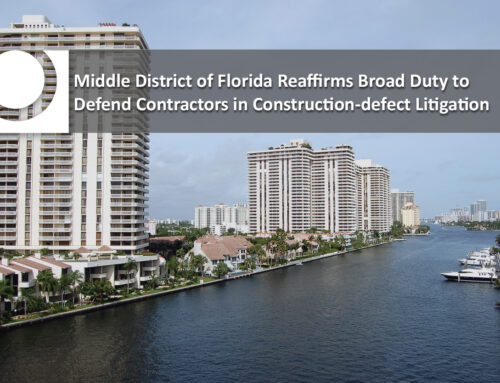Last week, a Florida circuit court found an insurer jointly and severally liable not only for post-tender attorney’s fees but, because the insurer had refused to defend its insured, the insurer was liable for pre-tender attorney’s fees as well.
In Centex Homes v. Builders FirstSource-Florida, LLC, Centex Homes developed a residential condominium community. Centex Real Estate Corporation, the general contractor, hired Builders FirstSource-Florida, LLC (“BFS”) to supply and install the windows for the project. BFS was insured by Liberty Mutual Fire Insurance Company (“Liberty”), and the two Centex entities were named as additional insureds under the Liberty policies.
In December 2010, Hammock Grove Condominium Association sued Centex for construction defects, including defective window installation. In February 2011, Centex filed third-party complaints against various subcontractors, including BFS, alleging breach of contract, contractual indemnity, and/or common law indemnity. In October 2012, Centex, as an additional insured, sent its first demand to Liberty for defense and indemnity. Liberty never responded to Centex’s tender, but nothing in the opinion explains Centex’s 18-month delay either.
Eventually, Liberty conceded that Centex was an additional insured under the Liberty policies and that Liberty owed a duty to defend Centex against Hammock Grove’s claims. But what was the extent of Liberty’s liability for attorney’s fees incurred by Centex?
First, the Court found that Liberty was jointly and severally liable for the entire amount of attorney’s fees incurred by Centex in defending Hammock Grove’s claims (the order does not identify Centex’s own insurers). While the order does not provide much of an analysis, the Court cited caselaw holding that the duty of each insurer to defend its insured is “personal” and does not inure to the benefit of any other insurer. In other words, an insurer is liable to its insured for a full and complete defense — even if other insurers may have a duty to defend as well.
Second, the Court found that because Liberty did not agree to defend Centex upon tender of the defense, Liberty was required to pay all pre-tender attorney’s fees incurred by Centex. The Court reasoned that, because Liberty refused to defend Centex, Liberty could not be prejudiced as a matter of law. While the opinion is silent as to Liberty’s arguments against the award of pre-tender attorney’s fees, Liberty most likely argued that it was prejudiced by Centex’s late notice, which would be a breach of the policy conditions. Normally, the issue of whether an insurer was prejudiced by a breach of policy conditions is a fact question for the jury. But the Court ruled that Liberty could not have been prejudiced as a matter of law due to Liberty’s denial of defense. The order cited Nationwide Mut. Fire Ins. Co. v. Beville, which held that due to the insurer failing to provide an unconditional defense to the insured, the insured was entitled to recover its attorney’s fees as a matter of law, even though the insured had violated the policy provision requiring prompt notice of the claims.
The message: insurers ignore a tender of defense at their peril.



